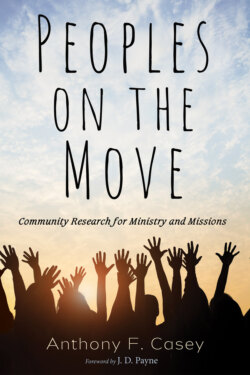Читать книгу Peoples on the Move - Anthony F. Casey - Страница 4
Foreword
ОглавлениеGlobalization creates a paradox regarding how we view the world. On the one hand, we are told this reality makes the world a smaller place. Cultural lines become blurred. Peoples move and bring societal change. On the other hand, we know the global population continues to increase. Culture, even in a small community, is not monolithic, and migration is more widespread than any time in history. The world is a big place. In some ways, globalization brought simplicity; in other ways, it increased complexity. The result is an increased need for the church to understand the constantly changing contexts.
While over the past forty years some Christians have come to appreciate the role of research and community studies, many see little value in such work. Few desire to conduct research in their communities. The irony of this unfortunate situation is that many of those people want to reach their neighbors with the gospel, but will often say they do not know how. Yet, God in his grace has provided a tool to assist in our Great Commission efforts—research.
Christians are people of zeal. While this is a good thing, it is not the only thing. The writer of Proverbs notes, “desire without knowledge is not good, and whoever makes haste with his feet misses the way” (Prov 19:2, ESV). The internal drive for God’s glory among the nations is to be part of who we are as Christ’s followers. However, unbridled passion can take us in unhealthy directions and cause us to wonder why we are not seeing the gospel spread rapidly and with honor (2 Thess 3:1). God in his grace has provided a partner to be wed to our zeal: knowledge. And knowledge, especially of our contexts, is often found through the divine blessing—the tool of research.
We are quick to forget that community research is found throughout the Bible. Moses sends spies into the land to conduct a survey (Num 13). Later, Joshua sends spies into the same land to do likewise (Josh 2:1). Nehemiah was moved to action because he heard the report of the reality of Jerusalem (Neh 1:2–11) and even did some survey work under the cloak of darkness (Neh 2:12–15). When calling people to count the cost of discipleship, Jesus notes how even the people of this world discern their realities to make decisions in life (Luke 14:28–32). Research is a matter of kingdom stewardship.
This book is designed to help you become a better steward for the glory of God among the nations—in your community, across North America, and throughout the world. I pray that you will accept the challenge to go against the status quo and learn how to understand the peoples around you. Such knowledge will provide you with better insight for proper methods of evangelism, discipling, and church-planting.
Anthony Casey has done a wonderful job helping the church in the neglected area of research. This work fills a massive void in the literature. Search the libraries for books on how to conduct community studies for ministry and the results are meager. This book explains the importance of culture and the basics of ethnographic research. It is not written to make you a social scientist. Rather, it was written to equip you for the work of the ministry to which you have been called.
I have spent years studying, teaching, and applying social research methods. One of the biggest challenges involved taking the sociological and anthropological “secular” works, processing them through my theological and missiological filters, and then discerning how to apply them to my local church and missionary activities. It was a challenging process for the seminary professor, and even more difficult for the non-academician. Casey is correct: “community research can be intimidating and many books on the subject are overly technical.” So, what has he done about this challenge? He has written this excellent book.
Peoples on the Move: Community Research for Ministry and Missions is a pioneer work. I wish this book was written years ago! This work takes the best information in the field and condenses it into a volume that many people will be able to understand and apply to their contexts. Casey has taken the best-of-the-best for understanding how to conduct community research and made the complex processes highly assessable. This is the skill of a great teacher.
But this book also shows the skill of a great practitioner. What is found here is not a work of theory. This writing was birthed out of applying study to the field. These pages are filled with stories of Casey’s experiences in the United States, across North America, and throughout the world. He shows the local church leader and missionary how they can conduct research in their fields that leads to disciple-making. This is not a book of abstract ideas and lofty theoretical concepts. Casey writes to assist the reader for more effective ministry.
While God does not need research to advance the gospel, he often uses it to move his people to the fields of lostness and enable effective ministry engagement. Casey knows his subject and he knows how to help the reader move to the practical. If you want to understand your setting, then allow him to be your guide to such knowledge and application.
J. D. Payne, PhD
Associate Professor of Christian Ministry
Samford University
